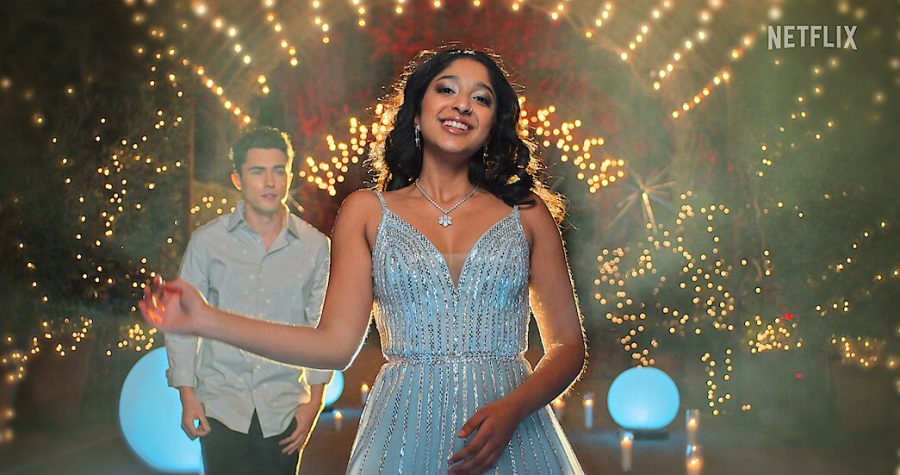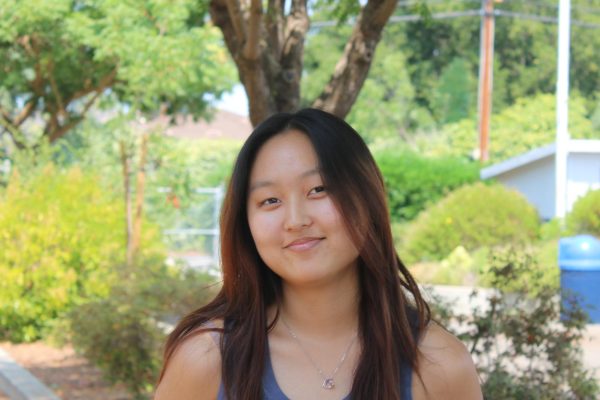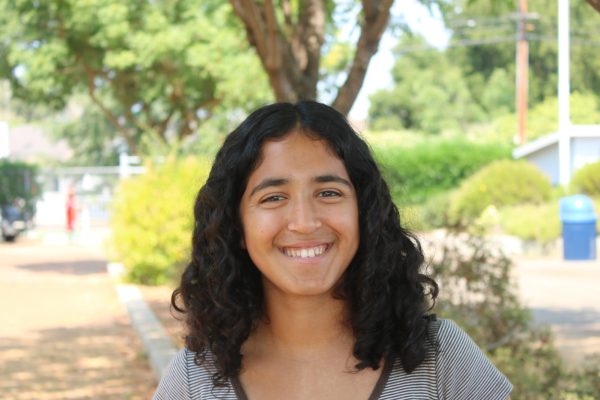“Never Have I Ever”… watched a show this good
Devi Vishwakumar, the main character of the hit show “Never Have I Ever,” walks proudly into her high school winter ball with her love interest Paxton Hall-Yoshida behind her.
Since this is specifically a review of the third season, there are spoilers from this point on.
Never have I ever watched a show where the main character has two boyfriends at the same time, gets drunk at a Model UN conference and gets attacked by a coyote at a party.
If you’ve watched the hit Netflix show, “Never Have I Ever”… you can put all your fingers down.
“Never Have I Ever,” directed by Mindy Kaling and Lang Fisher, follows Devi Vishwakumar, a South Asian teen girl growing up in the San Fernando Valley of Southern California. While the show is characterized by its wild and exaggerated antics, it remains grounded in its relatable and realistic characters, despite how different their personalities are.
Throughout the teen drama and Devi’s different developing romantic relationships, the show’s three seasons have a central focus on Devi’s struggle with grief several months after her father’s death at the start of her sophomore year.
After a wild hurricane of a second season, season three begins with Devi entering an official relationship with Paxton and maintaining her friendship with Ben after attempting to simultaneously date both of them. However, Devi begins this relationship extremely insecure. While Devi is ecstatic to openly showcase her love for Paxton to the entire school, her classmates definitely are not — going as far as to call Devi a sl*t. This becomes a catalyst for problems in Devi and Paxton’s relationship later on. Despite their eventual decision to split from their relationship, Devi’s surprisingly mature reaction shows her immense character development.
Since its buildup from the first season, the show has been consistently successful in transforming cliche, one-dimensional high school archetypes into realistically diverse, authentic human beings. During the first season, Paxton was the popular swim team captain everyone wanted to be with — but at the end of the third season, he credits Devi with helping him become a better, more self-disciplined, genuine and hard-working version of himself.
The newest season handles a combination of typical teenage drama and more complex issues. Devi’s long-term struggle with grief over her father’s death also affects all of her romantic relationships throughout the show. The season displays Devi’s growth and maturity in viewing her grief and how to celebrate her father instead of guiltily mourning him. Through Devi’s consistent therapy sessions all three seasons, it’s clear that it has a positive influence on her life, through her growth and maturity. She progressed from flat-out refusing to talk to her therapist, Dr. Ryan, about her dad’s death, to the third season, where she is able to discuss it through free will, processing it with Dr. Ryan.
The progress she makes in therapy is truly shown when Devi performs in her first orchestra concert since her father died. She struggles with it in the moment but finds the strength to overcome it and perform in the recital, a major milestone for her character. It highlights the message that grief comes in waves; it’s never one and done. This is part of the beauty of the show — characters deal with real issues in real ways, as opposed to the oversimplified, “magical fix” approach many other shows take.
Aside from the developments of Devi and Paxton, Ben — Devi’s unfortunate and chronically overworked ex-boyfriend — also shows immense growth. To live up to his father’s expectations, he juggles an unrealistically large load of classes and extracurriculars. Due to the unsustainable amount of schoolwork, Ben eats a diet consisting solely of beef jerky sticks — leaving rotting feces inside his body. The incorporation of Ben’s seemingly impossible workload feels relatable because, as unrealistic as it sounds, that story is a reality for many kids today, especially here in the Bay Area.
While the show focuses on Devi, it also works to develop her love interests as real and interesting characters instead of plot devices to create drama. This idea overlaps with the character of Des, Devi’s third love interest and first Indian boyfriend. Unlike practically every Asian character in television, the varsity debater and academically-minded Indian is not portrayed as a boring, geeky nerd — he’s cool, he’s popular and he’s cute. Despite his primary role as another one of Devi’s boyfriends, he furthers the social commentary of the show in regard to microaggressions and stereotypes rooted in racism. Within his first five minutes of screen time, he goes on a mid-length monologue criticizing Devi’s assumptions about academically achieving Indian men.
The show’s not-so-subtle social commentary is also delivered in style, never sacrificing comedy for eloquence. In the earlier episodes of the season, Devi becomes jealous of Paxton’s friend Haley, and begins to slut-shame her — until she stops herself, acknowledging that Haley’s reputation is most likely “perpetuated by the patriarchy.” The show is also unique in the subversion of predominantly white-casted characters into a more diversely populated group of actors.
It was most definitely refreshing for many to see people of color as the main leads on a mainstream Netflix show, particularly for South Asians.
“I realize this now, that I always watched TV and movies as a kid watching the white girl be the desired one… that takes a little bit of a toll on you because you’re like, ‘Huh, she’s the pretty girl. I’m not that girl,’” actress Maitreyi Ramakrishnan, who plays Devi, said in an interview with Associated Press. “So many South Asian girls watch Devi walk into the winter dance in season two and they’re like, ‘Wow, she is just as beautiful and all of these guys around her recognize it as well,’ and we look like her.”
“Never Have I Ever” masterfully juggles grief, romantic relationships, and cultural and family dynamics, all while maintaining its trademark light-hearted, witty and funny tone. “Never Have I Ever” shines in its unapologetic attitude to combining both serious and comedic components to its vibrant story, unlike many other typical high school dramas struggling to pick between the two.





